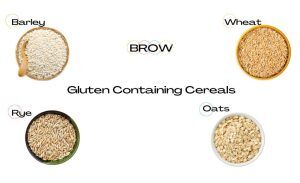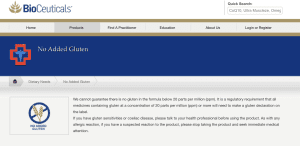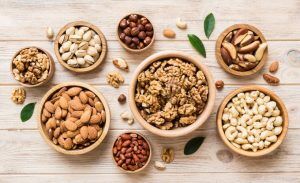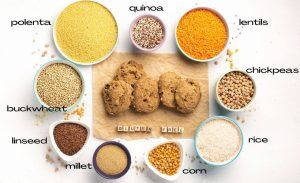
When managing celiac disease in children, diet is crucial. A gluten-free diet is the primary treatment, but many parents wonder about the roles of probiotics and prebiotics in supporting gut health. Let’s explore the evidence, food sources, and considerations for incorporating these elements into your child’s diet.
Celiac Disease (CD) is an autoimmune condition triggered by gluten, a protein found in wheat, barley, rye and oats. When a child with CD eats gluten, it can damage the lining of their intestines, making it harder for them to absorb nutrients.
 This damage can also disrupt the balance of healthy gut bacteria and increase the permeability of the intestinal wall, which may lead to additional health concerns, such as a failure to absorb nutrients such as iron, Vit D and zinc.
This damage can also disrupt the balance of healthy gut bacteria and increase the permeability of the intestinal wall, which may lead to additional health concerns, such as a failure to absorb nutrients such as iron, Vit D and zinc.

Understanding Probiotics and Prebiotics
Probiotics are specific live microorganisms that, when taken in adequate amounts, provide health benefits, particularly for gut health. These are often found in supplements or certain fermented foods, but not all fermented foods qualify as probiotics since they may contain various strains that haven’t been studied for specific health benefits.
Prebiotics, on the other hand, are types of dietary fibre that feed the beneficial bacteria in the gut. They can enhance the effectiveness of probiotics and support a healthy gut microbiome. Common prebiotic-rich foods include garlic, onions, bananas, and asparagus.

Probiotics and Coeliac Disease
Emerging research indicates that probiotics may offer several benefits for individuals with coeliac disease, particularly in improving gut health and alleviating symptoms. Probiotic strains can help restore balance to the gut microbiome, which is often disrupted in celiac patients. Probiotics may reduce digestive symptoms like bloating, diarrhoea, and abdominal discomfort by promoting better digestion and enhancing gut flora diversity.
Moreover, specific strains of probiotics (such as Lactobacillus and Bifidobacterium) have been shown to exert protective effects on the gut lining, potentially shielding epithelial cells from damage caused by gliadin, the harmful component of gluten. By reducing inflammation and helping to regulate immune responses, probiotics may also aid in promoting gut healing, which is crucial for managing the ongoing effects of celiac disease.
Specific strains have been identified as particularly helpful in improving symptoms associated with coeliac diseases:
Lactobacillus rhamnosus GG (LGG)
- Food Sources: Commonly found in fermented dairy products like yogurt and kefir, specifically labeled as containing LGG.
- Supplements: Available in over-the-counter probiotic supplements.
Bifidobacterium longum
- Food Sources: Found in fermented dairy products like yogurt, as well as certain types of fermented vegetables such as sauerkraut and kimchi (non-sterilised).
- Supplements: Can also be found in probiotic supplements.
Bifidobacterium infantis
- Food Sources: Rare in foods, but it may be present in some probiotic-enriched products such as infant formulas or certain yogurts marketed for digestive health.
- Supplements: Often available in infant-specific probiotic supplements.
Lactobacillus casei
- Food Sources: Present in fermented foods such as yogurt, kefir, miso, kimchi, and fermented soy products.
- Supplements: Available in capsule or liquid probiotic supplements.
Lactobacillus reuteri
- Food Sources: Found in some types of yogurt, sauerkraut, and fermented milk products.
- Supplements: Commonly available in probiotic supplements.
Bifidobacterium breve
- Food Sources: Found in fermented dairy products such as cheese and yogurt.
- Supplements: Available in probiotic supplements targeting gut health.
Bifidobacterium lactis
- Food Sources: Present in fermented dairy products like yogurt, kefir, and buttermilk.
- Supplements: Found in over-the-counter probiotic supplements, often marketed for digestion and immune support.
While evidence is still evolving, these specific strains can help improve symptoms by restoring microbial balance after the introduction of a gluten-free diet. Some dairy-free alternatives soy or coconut based may provide sources of useful live cultures.

Are Probiotics and Prebiotics Necessary After Starting a Gluten-Free Diet?
Even after adopting a strict gluten-free diet, there may still be value in maintaining probiotics and prebiotics in your child’s diet. The gut microbiome can remain altered even after gluten is eliminated, and ongoing use of probiotics may assist in re-establishing a balanced microbiome.
Probiotics and Gluten-Free Safety: What You Need to Know
When purchasing gluten-free (GF) probiotics, it’s essential to be cautious, as some products labeled as ‘gluten-free’ may still contain traces of gluten. A US study found that 12 out of 22 probiotics tested (55%) contained gluten, and alarmingly, 67% of those products were labeled as ‘gluten-free.’ While such issues have not been highlighted in Australia, it’s still important to remain vigilant. In cases where probiotics contain gluten, no health benefits can outweigh the potential harm they pose, especially for those with celiac disease or gluten sensitivities.
Even reputable practitioner-only brands like BioCeuticals cannot always guarantee their GF products meet the standard of being below 20 parts per million (ppm) of gluten.
Currently, over-the-counter probiotics in 2024 are not certified gluten-free. However, advocacy for GF certification is growing, and many hope to see more products with this certification to ensure safety for individuals with celiac disease. For more information on gluten-free certified products sources like Coeliac Australia are worth consulting.

Sources of Probiotics and Prebiotics
Fermented Foods and Probiotics
While not all fermented foods are classified as probiotics, those that contain specific strains can offer various health benefits. Notable examples include:
- Yogurt
- Kefir
- Sauerkraut
- Kombucha
- Kimchi
These products are typically labeled as containing live cultures and can be found in the refrigerated section of stores. If a product is not kept refrigerated or has been pasteurised, it likely does not contain live cultures.
1. Fruits
- Bananas
- Custard Apples
- Nectarines
- White Peaches
- Persimmons
- Tamarillos
- Watermelon
- Rambutan
- Grapefruit
- Pomegranate
2. Vegetables
- Garlic
- Onions
- Leeks
- Asparagus
3. Grains and Legumes
- Whole Grains (e.g., oats, quinoa)
- Legumes (e.g., lentils, chickpeas)
4. Nuts and Seeds
- Nuts (such as pistachios and cashews)
- Seeds (such as chia or flaxseeds)

5. Dried Fruits
-
- Dates
- Figs

Incorporating probiotics and prebiotics into the diet of children with celiac disease can be beneficial. While the gluten-free diet is essential, maintaining gut health through specific strains of probiotics and prebiotic-rich foods—whether from natural sources or gluten-free supplements—can support overall wellness.
As always, consult with a healthcare provider for personalised advice tailored to your child’s specific needs.
Surprising Ways to Support Your Gut Flora: Sleep, Exercise, and Nature
The human gut is home to trillions of microbes, forming a complex ecosystem known as the gut microbiome. This community plays a vital role in digestion, immune function, mental health, and overall well-being. While many know that diet, particularly the intake of fiber and fermented foods, influences gut health, some lesser-known lifestyle factors can also support a healthy microbiome. Recent research has shown that sleep, exercise, and exposure to nature can have profound effects on gut flora, surprising many in how integral these aspects of daily life are to gut health.
The Power of Sleep
Sleep is essential for many bodily functions, and its impact on the gut microbiome is often underestimated. Poor sleep, particularly chronic sleep deprivation, can disrupt the balance of gut bacteria, leading to gut dysbiosis—a condition in which harmful bacteria outnumber beneficial ones. This imbalance has been linked to various health issues, such as inflammation, weight gain, and metabolic disorders.
Studies suggest that gut bacteria may follow circadian rhythms, just like humans do, and disruptions in sleep can alter these rhythms, leading to imbalances in the gut flora
Exercise: More Than Just Fitness
Exercise is well-known for its physical and mental health benefits, but its impact on gut health is now receiving attention. Regular physical activity has been shown to increase the diversity of gut bacteria, which is associated with better overall health. The gut microbiota of physically active individuals tends to be more diverse compared to those with sedentary lifestyles.
Aerobic exercise, such as running, cycling, or swimming, appears to be particularly beneficial for enhancing the diversity of the gut microbiome. Studies have found that endurance training can increase the abundance of beneficial bacterial species, such as Akkermansia muciniphila, known for its role in protecting the gut lining and reducing inflammation
Even resistance training, such as weightlifting or bodyweight exercises, has been shown to positively affect gut flora by promoting bacteria that support metabolic health
Nature: A Source of Microbial Diversity
Spending time in nature does more than provide a mental reset—it also supports your gut microbiome. Exposure to a variety of environmental microbes through activities like gardening, hiking, or simply spending time in natural surroundings can enrich the diversity of gut bacteria. Research has shown that those who live in rural areas or spend more time outdoors tend to have a more diverse gut microbiome compared to those living in urban environments.
This connection between nature and gut health is particularly significant in children, as early exposure to a wide range of microbes can strengthen the immune system and promote lifelong gut health
For city dwellers, simply getting outside more often—whether it’s a park visit, outdoor exercise, or time spent gardening—can increase contact with beneficial environmental microbes. Even spending time with pets has been linked to a more diverse microbiome.
Stress Management and Mindfulness
Managing stress effectively is another surprising way to support gut health. The gut and brain are closely connected through the gut-brain axis, a communication network that links emotional and cognitive centers of the brain with intestinal functions. Chronic stress can negatively affect the gut by disrupting this communication and causing inflammation, leading to gut dysbiosis.
Stress-relieving activities like meditation, yoga, and deep breathing exercises have been shown to positively influence gut health by lowering cortisol levels and reducing gut inflammation. Mindfulness practices can help regulate the body’s stress response, creating a more balanced internal environment that supports a healthy gut microbiome
Sources
- For more info on prebiotics visit: https://www.monash.edu/medicine/translational/gastroenterology/prebiotic/faq#6
- Ali B, Khan AR. Efficacy of Probiotics in Management of Celiac Disease. Cureus. 2022 Feb 8;14(2):e22031. doi: 10.7759/cureus.22031. PMID: 35340497; PMCID: PMC8912170.
- de Sousa Moraes LF, Grzeskowiak LM, de Sales Teixeira TF, Gouveia Peluzio Mdo C. Intestinal microbiota and probiotics in celiac disease. Clin Microbiol Rev. 2014 Jul;27(3):482-9. doi: 10.1128/CMR.00106-13. PMID: 24982318; PMCID: PMC4135898.
- de Clercq, N. C., et al. “The impact of sleep on gut microbiota: Focus on shiftwork.” Journal of Sleep Research, 2019.
- Allen, J. M., et al. “Exercise alters gut microbiota composition and function in lean and obese humans.” Medicine & Science in Sports & Exercise, 2018.
- Blaser, M. J. “Missing Microbes: How the Overuse of Antibiotics Is Fueling Our Modern Plagues.” Henry Holt and Company, 2014.
- “Nature exposure boosts gut microbial diversity.” Environmental Microbiome, 2020.


